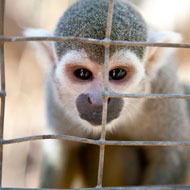Petition to ban pet primates

Thousands of primates are being kept as pets in the UK.
A new campaign is calling for a UK ban on keeping primates as pets. BVA and a coalition of charities say they are concerned about the level of suffering faced by animals kept in unnatural environments.
It is estimated that thousands of primates are being kept as pets in the UK. Rescue groups such as the RSPCA and Wild Futures say they receive at least one call a week about the welfare of a monkey and it is feared this is just the tip of the iceberg.
Rachel Hevesi, director at Wild Futures Monkey Sanctuary said: "Every primate that we have rescued has arrived with physical and/or psychological damage. It can take years of intensive care for them to recover."
An online petition is urging the UK Government to end the keeping and trading of these complex animals. Since its launch yesterday (24 September), it has already received over 1,300 signatures.
BVA president John Blackwell said the organisation has "significant concerns" as to whether the welfare needs of privately kept primates can be met.
"Some people but primates as fashionable 'accessories' but these long-lived, intelligent, socially complex animals are not like dogs and cats and are extraordinarily difficult to properly care for," he commented.
Charities involved in Protect Primates include the RSPCA, Born Free Foundation, Wild Futures, Captive Animals' Protection Society, Four Paws and OneKind.
Fifteen countries in Europe have already banned keeping all or some species of primate as pets. BVA is urging England, Wales and Northern Ireland to follow suit. The organisation says it is also working with the Scottish Government as it conducts its own review of the trade and importation of exotic animals for the pet trade.



 The latest
The latest